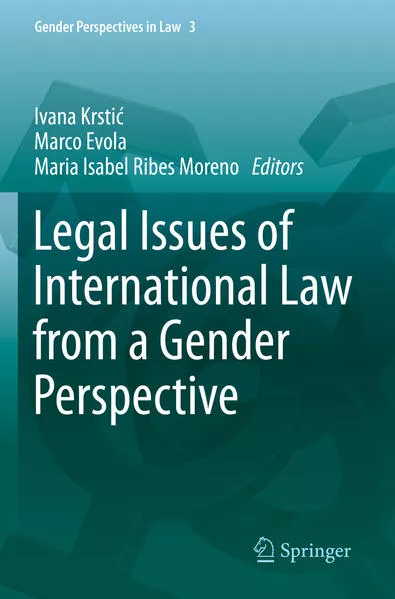
- Publikationen ca: 3
- Fragen & Antworten
Ivana Krstić
Ivana Krstić is a Full Professor of International Human Rights Law and International Public Law at the University of Belgrade, Faculty of Law. She is Director of the Human Rights Centre and the Institute for Social and Legal Sciences at the University of Belgrade, Faculty of Law. She obtained her LLM (2003) at the School of Law, University of Pittsburgh (USA), along with an LLM (2004) and Ph.D. (2008) at the University of Belgrade, Faculty of Law. In the academic year 2006/2007, she was a Chevening Scholar working on her Ph.D. research at Exeter College, Oxford University. She teaches several courses, including the European Immigration Law and Policy, Non-Discrimination, Law, International Jurisprudence, International Humanitarian law, Gender Equality, and Minority Rights. She is also a member of several governmental bodies, including the Republic Commission for Transgender Persons. As a leading Serbian expert in human rights, she is engaged in many projects run by various international organizations and agencies, such as OHCHR, UNDP, UNICEF, UNWOMEN, OSCE. She closely cooperates with Serbian Commissioner on Protection of Equality and with the Judicial Academy, coordinating and directing many trainings for judiciary, but also for other public officials. Since 2015, she is engaged as a Serbian expert for both, non-discrimination and gender quality stream at the European Equality Law Network (EELN). She has published monographs and textbooks, around 20 handbooks, and more than 60 articles in international human rights law, international refugee law, and international public law.
Marco Evola is an Associate Professor of European Union Law LUMSA Department of Law Palermo. He obtained his Ph. D (2008) at the University of Palermo. He was post-doctoral researcher at the University of Palermo (2009-2013). He has been teaching European Union Law, European Union Private International Law, Human Rights, European Migration Law. He was a member of different research groups within the framework of projects of research of national interest. He is professor in Masters and post-lauream courses. He is a member of the Editorial Board of the review Diritti umani e diritto internazionale and Member of the Scientific Committee of the review La Magistratura. He is a member of the college of professors of the Ph.D course “Mediterranean Studies. History, Law and Economics”. His scientific research focuses on human rights, migration, non-discrimination, accession to and withdrawal from the EU, Rule of Law. He has published a monograph on the legal status of third-country migrant workers in the EU legal system.
María Isabel Ribes Moreno is an Assistant professor of Labour Law and Social Security Law in University of Cádiz. She holds a Bachelor’s Degree on Law from the University of Sevilla, Master in Company’s Legal Advice from I.E. (Madrid) and a PhD in Law from the University of Sevilla (with honours). Her research activities have focused mainly on the analysis of Maritime Labour Law and all aspects of social and working conditions of seafarers, posted-workers, workers in port services, fishermans and general workers, both in their labour and in their social security dimensions, and about European Labour Law and non-discrimination law regarding gender and dissability. She is the author of a monograph and co-author of many articles published by scientific reviews and chapters included in collective monographs dealing with these issues. Since 2000, she has been a researcher in various Research and Development Projects. She has carried out research stays at some of most prestigious universities, such as the Institute of European and Comparative Law in the University of Oxford, Institute of Labour Law at KU Leuven, London School of Economics and Political Science and University of Sheffield. She has experience of teaching in different areas of Labour, Employment and Social Security Law, giving lectures for master, bachelor degrees and Jean Monnet Module (574698-EPP-1-2016-1-ES-EPPJMO-MODULE) in different degrees and Universities. She is a Mediator in the Extrajudicial Autonomous Service of Resolution of Labour Conflicts of Andalusia, Member of the International Network Maritime Work Watch (MWW), the CIELO community, member of the Spanish Association of Labour and Social Security Law and the INDESS (University Institute of Research for Social Sustainable Development) at University of Cádiz.
Legal Issues of International Law from a Gender Perspective
This book offers a new perspective on international law, which was, for centuries, male-dominant and gender-blind. However, this gender blindness has led to many injustices, the failure to recognize certain rights, and to impunity for serious crimes. The book examines the development of gender perspectives in various branches of international law, while also discussing and explaining certain universal standards.
Legal Issues of International Law from a Gender Perspective
This book offers a new perspective on international law, which was, for centuries, male-dominant and gender-blind. However, this gender blindness has led to many injustices, the failure to recognize certain rights, and to impunity for serious crimes. The book examines the development of gender perspectives in various branches of international law, while also discussing and explaining certain universal standards.
Legal Issues of International Law from a Gender Perspective
This book offers a new perspective on international law, which was, for centuries, male-dominant and gender-blind. However, this gender blindness has led to many injustices, the failure to recognize certain rights, and to impunity for serious crimes. The book examines the development of gender perspectives in various branches of international law, while also discussing and explaining certain universal standards.


